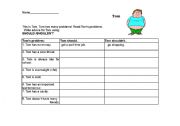
|
Should and Shouldn�t
Tom has many problems (no money, overweight etc). Give Tom advice using should/shouldn�t.
Level: elementary
Age: 14-17
Type: worksheet
Downloads: 14
|
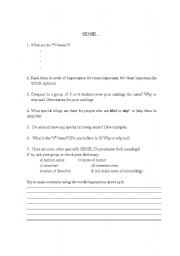
|
Sense
A pair/group discussion print about the 5 senses. Also has idioms that use the word sense (fashion sense, 6th sense etc).
Level: intermediate
Age: 14-17
Type: others
Downloads: 3
|
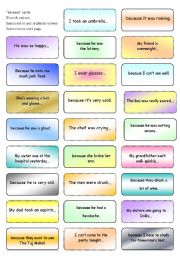
|
Because...
Students have to match sentence halves using BECAUSE. If the cards don�t match, it makes a funny sentence: ex: My father went to the hospital BECAUSE it was raining. 3 ideas/games on second page. Similar to my previous worksheet "to" infinitives.
Level: elementary
Age: 14-17
Type: activity-card
Downloads: 144
|
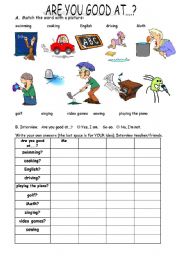
|
Are you good at swimming?
A fun and useful activity. Students match written words (swimming, Math, sewing, golf, video games etc.) to funny pictures. Then, they interview their teacher/friends (or parents for homework) asking "Are you good at (swimming)? Yes, I am/So-so/No, I�m not. Higher levels can write full answers in the chart, lower levels can draw checks/x�s or happy...
Level: elementary
Age: 7-17
Type: worksheet
Downloads: 311
|
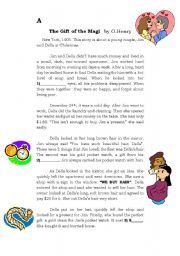
|
Gift of the Magi (Xmas lesson plan)
An adaptaion of the famous story by O.Henry about a poor couple who sell their important things to buy each other presents, but in the end the presents are useless (they are happy anyway).
Lesson includes a reading, comprehension and discussion questions. Teacher�s instructions on the last page.
Level: elementary
Age: 14-17
Type: lesson-plan
Downloads: 66
|
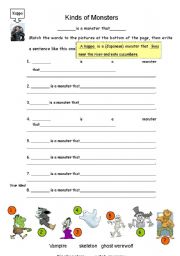
|
Kinds of Monsters
Students write sentences describing monsters using THAT clause (ex. A ghost is a monster that can fly and lives in haunted houses). Adapted from bogglesworldesl.com. Hope you enjoy it!
Level: elementary
Age: 13-17
Type: worksheet
Downloads: 4
|
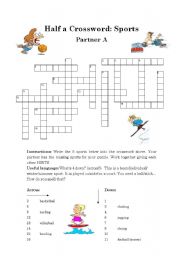
|
Half a Crossword: Sports (Pairwork)
Pairwork: Students each have 8 sports (they write into the crossword). Then, give and receive hints to fill in the missing words: Example: A: What�s 7 across? B: It�s a winter sport, played on ice. A: Is it figure skating? B: No, there are many players who use a stick and puck.A:Oh, I see. Ice hockey. B: That�s right! (A writes ice hockey into his ...
Level: elementary
Age: 14-17
Type: worksheet
Downloads: 30
|
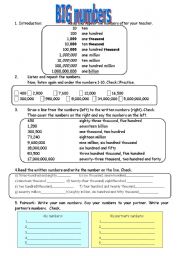
|
Big Numbers Lesson Plan w/Fun Quiz
Lesson Plan includes introduction and practice of large numbers, Quiz (Ex: how far is the earth from the sun? How many times does the human heart beat in one day? etc -second page) and Teacher�s Instructions.
Level: elementary
Age: 14-17
Type: Choose
Downloads: 315
|
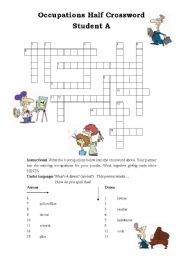
|
Half Crossword-Occupations (Pairwork)
Pair Work: Get students talking with this HALF crossword (topic is jobs). Students write their hints in the puzzle. Then, giving and receiving hints about the missing words they fill out the puzzle. Example: A: What�s 5 across? B: This person works in a restaurant. A: Is it a waiter? B: No, this person makes the food. A: Is it a chef? B: Yes, that�...
Level: elementary
Age: 14-17
Type: worksheet
Downloads: 42
|
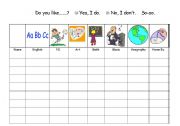
|
Do you like Math?
Get kids talking! Use this to review/teach school subjects, then students interview each other asking: Do you like (subject)? Write friend�s answers (Yes/No/So-so) in the box next to their name (for very young students, you could have them write a check or x or happy/unhappy face -if they can�t print yet).
Level: elementary
Age: 5-17
Type: activity-card
Downloads: 5
|